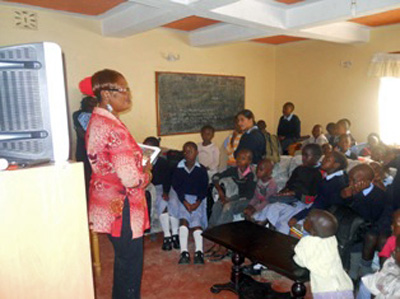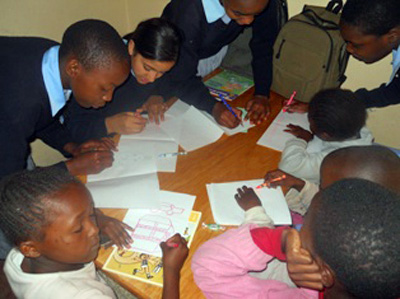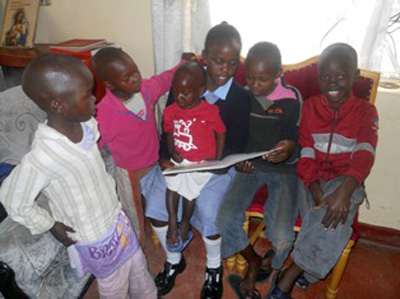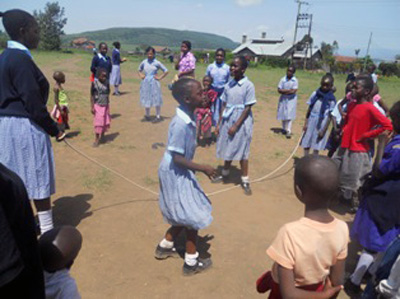by Margaret Muthiga, Member of the IRA Teacher Advisory Panel
 The Reading Club at our Kilimo Primary School in Kenya organizes Orphans Day once a year. This year was no exception. On 1st June 2012 the reading club visited Haven of Hope children’s home. Their time table was tight. The main objective was to “take reading further.”
The Reading Club at our Kilimo Primary School in Kenya organizes Orphans Day once a year. This year was no exception. On 1st June 2012 the reading club visited Haven of Hope children’s home. Their time table was tight. The main objective was to “take reading further.”
The children’s home was founded by a former student of our school. The idea of starting the orphanage came to her when she picked up an infant left along the rail line. Though young and not married she took the challenge of keeping the baby when the security requested her to keep the child. From then on many babies have been brought to her. She now has 35 kids.
Every year we invite orphans to our school. We organize them according to their ages and give them different activities to do, from reading to games. This year we visited them, and it was fantastic! We taught the kindergarten children how to read and play reading games. In the reading competition for grade one, some children read and won gifts while the ones who never won cried and vowed to win the next time.
Listening in Sadness
When we learned how the children came to be at the orphanage, it was a sad moment. One could hear a pin drop—it was all ears and eyes glued to the little boys and girls as the story unfolded. One of the children whose parents died of AIDS, leaving him and his two sisters to fend for themselves, said, “I don’t know why God took both my parents and later took my grandmother as well. What would become of us?” he asked.
He then went on to explain that “My uncle has taken all of my parents’ savings and our beautiful home and lives there with his family. May be God had a purpose for us being left by those we loved, and maybe that is a lesson to you to always love and obey your parents.”
Another child was found thrown in a pit latrine immediately after she was born. Her cry attracted children who were passing there on their way to school who then went to the police and reported. The police removed the infant and took her to hospital and later registered the child with Haven of Hope children’s home. She is named Angel and she is two months old now. We thank God she survived.
Every year when we celebrate Orphans Day, we remember these children as some of the persons who don’t get access to reading books and other basic needs. Our children always go out of their way to extend their small hands to reach out to the needy young and old. Apart from helping the orphans, the children and I guide and counsel the sick, especially the infected children. Children also carry extra plates to feed those less fortunate.
The orphans also drew pictures to show their gratitude to Kilimo Primary Reading Club. We donated foodstuff, clothes, story books, and drawing material.
Making Winners of the Apparently Ordinary
The Reading Club has helped the children to improve their academic performance and reading skills. One of the school rules for joining the club requires students to read four story books and then write the same story in their own language to the Kiswahili or English teacher. Membership motivates the pupils to compete in classes by reading fluently so as to be appointed as a class librarian, which automatically gives you the ticket to join the reading club. This activity has made it even possible for the school to continue leading in the national examination every year in the district.
The task of the excellent teacher is to stimulate apparently ordinary people to unusual effort. The tough problem is not in identifying winners but it is in making winners out of ordinary people. May God bless TAP and IRA as we endeavor to do what we know is best for the children in our classrooms.
A hug is the shortest distance between friends, and each child in our classes is such a friend. I leave you with a final thought from the Kilimo Primary School Reading Club: “POVERTY IS THE WORST FORM OF VIOLENCE.”
In the photographs below, students in The Reading Club play reading and writing games with the orphans, read books to them, and receive instructions from Teacher Margaret.




Margaret Muthiga is a senior teacher at Kilimo Primary School in Nakuru County, Kenya, mmuthigaus@yahoo.com.
This article is an addendum to an article from the August/September 2012 issue
of Reading Today. IRA members can read the interactive digital version of the magazine here. Nonmembers: join today!
<a href="http://engage./directory/communitydetails/?CommunityKey=1e1d0278-6be6-4fac
-a1be-a119ce8ca58b">

